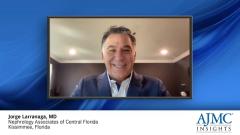
Barriers to Care for Patients With LN
Drs Larranaga and Wells describe challenges impacting access to care for patients with LN.
Episodes in this series

Jorge Larranaga, MD: As with any new drug coming into the market, we’ve experienced some [obstacles] to confront, particularly at our level, a lack of signatures to submit to insurance companies, submitting to local pharmaceutical places, ultimately delaying the patient’s start. As the pharmaceutical companies that have created these drugs have come to understand the different barriers that we’ve had—not just at an office level but also at an insurance level—they have become quite creative in creating a simple pathway to try to give the patients medications. Initially, I’d prescribe this drug, and it would take me 4 to 6 weeks to get medications, which wasn’t acceptable. We later got into a bridge program, and now we have samples in the office. We’ve come a long way in the last 6 months, keeping in mind that with voclosporin, the AURORA trial came out during the COVID-19 pandemic, so that has impeded a lot of these things.
There’s no doubt that we sometimes get frustrated because we have to provide peer-to-peer interviews, and sometimes the peer on the other end isn’t a nephrologist, has nothing to do with nephrology, and the verbiage we use and the urgency that we need isn’t quite understandable. Therefore, it takes multiple hurdles to try to get our patients approved, and it becomes a frustrating factor when it comes to the urgency of diagnosis, biopsy, and interventions.
Alvin Wells, MD, PhD: As a rheumatologist, when a patient comes in and I make the diagnosis of lupus nephritis, I want to get that patient on therapy [immediately]. As I talked about, you look at the nephrons. If they’re being picked off, time is nephrons. If you don’t get the patient under control—we say in about 3 or 6 months—there’s a chance that they can have more decrease in their renal function. We talk about getting patients on therapy as quickly as possible. I’m very aggressive in treatment. I start aggressive therapy from day 1.
I tell people that I can’t control the cost of these drugs. My main concern is that I want to make sure there are no disparities, that if I have a patient who has Medicaid, they get the same as patients with other insurances, because there’s no difference in the patient’s disease. I also like the fact that the companies that have these drugs have different programs and access to care. When you look at the numbers with voclosporin, most patients on this drug pay only $10 out of pocket. That’s up to 90% or 97% of the patients we see who are on it. That’s what we talk about.
If somebody calls and says, “These drugs are costly, and I want to put them on some other drugs, other calcineurin inhibitors where there are no data for 2 years like we have on voclosporin,” I say, “Don’t you want to treat [with] evidence-based [therapy]? What would you do if it was your daughter or somebody in your family? Are you going to use a drug that you don’t know will work, and this lady might have kidney disease in 2 years, and the 32-year-old daughter now is on dialysis?” No, patients are paying for my best advice. We talk about using evidence-based medicine and giving that information to say that we want to try to get the disease under control. In my practice, we have quite a few patients with lupus nephritis being treated with these drugs very aggressively, and we haven’t had any issues getting these drugs covered. Because at the end of the day, this is where we talk about disparities and making sure we erase those disparities and getting more equity and treating patients with lupus and lupus nephritis.
Transcript edited for clarity.
Newsletter
Stay ahead of policy, cost, and value—subscribe to AJMC for expert insights at the intersection of clinical care and health economics.











